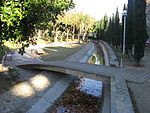Parliament of Catalonia

The Parliament of Catalonia (Catalan: Parlament de Catalunya, IPA: [pəɾləˈmen də kətəˈluɲə]; Spanish: Parlamento de Cataluña; Occitan: Parlament de Catalonha) is the unicameral legislature of the autonomous community of Catalonia, Spain. The Parliament is made up of 135 members, known as deputies (diputats/deputats/diputados), who are elected for four-year terms or after extraordinary dissolution, chosen by universal suffrage in lists of four constituencies, corresponding to the Catalan provinces. The Parliament building is located in Ciutadella Park, Barcelona. Established in 1932, after the grant of self-government to Catalonia by the Second Spanish Republic, it went to exile in 1939 as a consequence of the Nationalist victory in the Spanish Civil War. It was reestablished in 1979 during the transition to democracy. The most recent general election to the Parliament was held on 14 February 2021.
Excerpt from the Wikipedia article Parliament of Catalonia (License: CC BY-SA 3.0, Authors, Images).Parliament of Catalonia
Plaça de Joan Fiveller, Barcelona
Geographical coordinates (GPS) Address Phone number Website External links Nearby Places Show on map
Geographical coordinates (GPS)
| Latitude | Longitude |
|---|---|
| N 41.388055555556 ° | E 2.1888888888889 ° |
Address
Parlament de Catalunya
Plaça de Joan Fiveller
08001 Barcelona (Ciutat Vella)
Catalonia, Spain
Open on Google Maps










